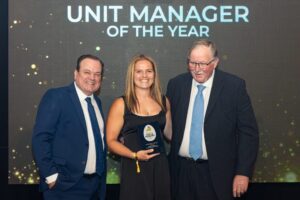Rebecca Reeves is making her mark as an impressive producer of organic eggs at Sir Richard Sutton in Berkshire. Michael Barker reports
Sir Richard Sutton Limited isn’t one of the highest-profile names in UK egg production, and indeed the firm is unusual in owning and managing a broad portfolio of trading assets and businesses across the hotel, property and farming sectors.
The company’s website feels more corporate than many of the family farming businesses associated with egg and poultry production, with its core objectives full of terminology such as a desire to “preserve and enhance the capital values” and “optimise the level of income to meet current stakeholder requirements”. It’s not the usual cosy language about sustainability and bird welfare that adorns many modern-day farming websites.

And yet, behind that rather arms-length veneer, the human face of the company is doing outstanding work in producing high-quality organic eggs, which it supplies through Stonegate and into Waitrose. That has led to well-deserved recognition for the driving force behind that success, Rebecca Reeves, who was named Unit Manager of the Year at the National Egg & Poultry Awards 2025 this summer.
Sir Richard Sutton’s poultry business is based in Berkshire, where Reeves manages 30,000 free-range organic birds across 15 sheds, making the company a significant player in the organic egg market. As poultry manager Reeves is in charge of everything from the production operations and auditing to hiring staff, training, working with stockpeople and ensuring compliance with the Soil Association’s standards.
Reeves’s path into poultry was atypical, and indeed she admits she “fell into farming”. The daughter of a computer technician father and pre-school teacher and hairdresser mother, it’s fair to say poultry was not the obvious career choice. “I’d wanted to do veterinary medicine,” she explains. “But after being at college for a few years and not wanting to go to university for another five, instead I started working as a receptionist at a local vet with the aim of doing veterinary nursing. And then one of the farms in Oxford where I first started working approached me about a poultry internship.”

The move made sense for Reeves, who had previously done plenty of work experience on farms, whether it be lambing, calving or helping out the vets. “I figured I liked the outdoors and I loved working with animals, so I grabbed the opportunity with both hands, moved out with my now husband and realised that actually it was poultry that I enjoyed the most,” she says.
That sliding doors moment meant the poultry industry has benefited from an unexpected new talent, and in the years since Reeves has undoubtedly made her mark. Working on two other family-run farms before landing at Sir Richard Sutton helped give her a good grounding in the industry, and now she has gained the knowledge and ability to recognise the various habits and mannerisms of her birds. “They’re quite interesting creatures,” she says. “If anything changes that causes any form of stress, or if they’re not in a good routine of having good food, light, ground, environment, and welfare, then their production fluctuates. It was really interesting to learn all of that on the job, and I then did my HNC in poultry production and learnt a lot more in depth. I have always wanted to keep expanding my knowledge and keep up with what’s changing.”
Focus on welfare
It might be true of every category of egg production, but Reeves stresses that for organic production animal welfare is of particular importance. The fact that medicines, pesticides and other similar production aids cannot be used within organic systems ramps up the pressure to get the environment absolutely right, and that means enrichment, clean water, tidy sheds, good seed and much more. Ultimately, it’s about preventing any issues before they are allowed to arise and creating conditions for the birds to do their job. “They are pretty simple creatures – if you do the basics, look after them in the best way and give them everything they need, the birds will produce good eggs,” she explains. “But there are definitely things you’ll come across that are a little bit more challenging than with your standard free range. Not being able to spray for weeds on the range, for example, and worm-testing the birds every month to make sure they’re under control.”
Reeves has put a strong focus on improving bird performance in her time in the business. The company’s 15 sheds are on a borehole, so meticulously cleaning the water tanks is a high priority. There’s been a commitment to improving gut health too, and enhancing the enrichment on offer by going above and beyond the number of items the Soil Association says needs to be in the sheds.
Outdoors, a planting programme has seen the addition of trees and bushes to encourage natural ranging behaviour and tempt the birds to move away from the shelter and use the whole two hectares of the range. Cover crops have also been planted, and while the weather put paid to their establishment this year, it’s an ongoing project to make the site as biodiverse as possible. “The birds look fantastic when they’re ranging so well,” Reeves points out. “They exhibit all those natural behaviours when they go outside – scratching, pecking, eating all the bugs and grubs within the ground – which is really lovely to see at this time of year.”
The organic method and outdoor ranging presents extra difficulties when it comes to biosecurity and fighting off the threat of avian flu. Each stockperson is allocated to just one of the three sites of birds to limit contamination and risk of disease, and there’s a robust plan in place in the event of another national lock-in. “If there is another lockdown we will be very stringent on our biosecurity when we’re going in and out of those sheds to ensure they’re not bringing in anything that could impact the birds,” Reeves explains. “It’s about making sure we’ve got plenty of enrichment in there to reduce any stress. But being 2,000-bird organic, they have a lot more space in the shed and they do acclimatise quite quickly when they have been shut in.”
Having 15 sheds instead of a single one housing 32,000 birds presents challenges too, given the requirement to keep on top of every single aspect of each and ensure everything is all functioning well. Reeves has three key full-time stockpeople doing daily checks, enrichment and ensuring everything is being done according to Lion Code and Soil Association standards, then there are collectors picking up the eggs themselves every day. There are a total of 14 people working on the site, including Reeves.
Staff training is therefore important, and recruits are encouraged both to learn on the job and take external qualifications. “We explain to people why we do certain things, but it’s also about hearing feedback from them and any ideas on what can be improved. It’s good to hear different perspectives and bring in new ideas from people with different job histories that can change things for the better,” she says.
Sir Richard Sutton has an environmental strategy board that is constantly looking at ways to reduce the carbon footprint, and that extends across the company’s interests from the farms to hotels and corporate offices. Stonegate is also monitoring a raft of producer data and analysing where further improvements can be made.
You need to be fit and resilient to manage such a broad operation, and Reeves says a combination of such a physical job and the fact she plays rugby every week gives her an edge. “Rugby is a good team and friendship environment outside of work, where you can switch off,” she explains. “It’s exhausting, but being out and about working on the farm already I’ve kind of got a baseline fitness before going into rugby training so that does give me a slight advantage!”
Organic market potential
According to Defra figures, only around 4% of the total UK egg market is organic, but among those consumers who do purchase them, they are highly prized. It’s unclear, though, how much potential there is to boost its share further. “It’s a hard question to answer because the price jump from free-range to organic eggs is quite high,” Reeves observes. “Shoppers are looking at it and thinking organic is the gold standard, but perhaps also thinking that free-range is enough for their budget. I feel like the organic market currently is very stable, but there could be room for growth.”
Reeves believes that customers know to some extent what constitutes an organic egg, but that not all shoppers understand the granular differences to the level of detail that farmers would like. The extra space in and outside the sheds, the absence of pesticides or medicines – it’s a difficult message to get across in a simple way that is both positively telling the organic story and not perceived to be bashing other production systems.
Reeves actually took part in a Waitrose advert for organic farming a couple of years ago, and she says media such as that is hugely educational in showing what poultry production looks like. Social media and product packaging also both have an important role to play, she adds.
Telling the industry’s story in general is something Reeves is a big believer in. She enjoys networking and playing an active role in the farming community, stressing that working together is the path towards a better situation for both producers and consumers.
It’s an attitude that has served her very well in her career so far, and will doubtless continue to benefit both Sir Richard Sutton and the wider egg industry.


